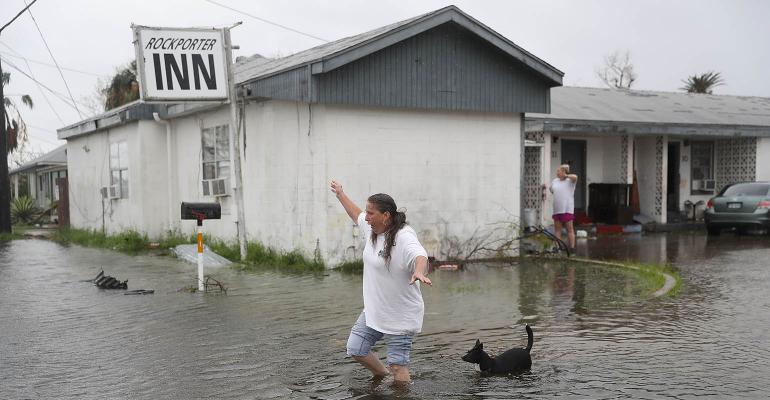(Bloomberg)—Houston’s hotel market, already the worst-performing in the U.S., is poised to take a further beating from Hurricane Harvey as the natural disaster creates chaos in a city that’s been reeling from low oil prices for the past three years.
Some area hotels are offering discounts to alleviate the temporary housing emergency, and Texas Governor Greg Abbott on Friday suspended the state and local hotel and motel occupancy tax for relief-effort personnel and storm victims. The suspension will last 14 days, according to the governor’s website.
The area’s hotels may be filled at first by first responders, Federal Emergency Management Agency workers, insurance adjusters and others dealing with Harvey’s aftermath -- and there may be fewer available rooms as some properties suffer damage from the storm. The longer-term impact for lodging, however, is likely to be negative, said Carter Wilson, vice president of consulting and analytics at STR, a data provider for the industry.
“It’s going to be very hard on Houston for the foreseeable future,” Wilson said. Marriott International Inc. and Hilton Worldwide Holdings Inc., the two largest hotel operators globally, said hotels in the affected area have the authority to waive cancellation fees.
The hotel industry in Houston, the fourth-largest city in the U.S. and its energy capital, has struggled because of depressed oil prices. Occupancy and room rates in the city are down for the third consecutive year, according to STR. Revenue per available room, an industry performance gauge, declined 4.6 percent year to date, after falling 12.5 percent last year and 3.4 percent in 2015, the firm said.
Houston’s hotel occupancy in the first seven months of 2017 averaged 62.7 percent, the lowest among the top 25 U.S. markets, according to STR. Houston hotel room rates are the sixth-lowest among those 25 areas, averaging $107 a night this year, below the $127 U.S. average, STR data show.
Hilton’s Hotels
Hilton, the world’s second-biggest hotel operator, said Monday that its properties in the Houston area haven’t had any “significant physical damage and remain open and operational with limited services.” The company cited minor water damage and said that in some cases it’s offering limited services because of disruptions to food deliveries or people being unable to get to work. Hilton said it has more than 1,000 workers in the flooded areas.
Initially, hotel demand will likely rise because of Harvey, with the hurricane “creating a temporary housing emergency in the state of Texas,” Abbott said in a statement on Aug. 25. Harvey may end up boosting revenue for hotels outside the Houston area as demand migrates away from the storm-hit area, including bookings for events such as conferences, said Wilson of STR.
Lodging REITs
Real estate investment trusts that own hotels are likely to be the only REIT segment to benefit from the storm, with displaced residents and aid workers driving an increase in demand from September to December, Michael Carroll, an analyst at RBC Capital Markets LLC, wrote in a note. REITs of other types, including apartment and health-care landlords, should see only modest financial impact from Harvey, according to Carroll.
Dallas hotels could benefit, as could hotels near airports in cities where travelers are stranded by the temporary closing of Houston’s airport, Wilson said. Houston is a gateway city to Central and South America. Hurricane Sandy, which struck the New York area in 2012, caused a spike in some cities due to flights being canceled, Wilson said.
Austin Bookings
Hotels in Austin, the state capital, and College Station, the home of Texas A&M University, reported extra bookings because of Harvey, with some selling out for tonight. Austin is 163 miles (262 kilometers) northwest of Houston, and College Station is 95 miles away. Austin Marriott South had guests who live in Houston extend their stay because of Harvey as well as additional bookings tied to the storm, a hotel representative said. Some people sought refuge or a place to take a shower after a day-long power failure two days ago.
“We have picked up both business and personal” reservations from Houston at the Ritz-Carlton and Hotel Crescent Court in Dallas, said John Goff, the billionaire head of Fort Worth, Texas-based Goff Capital Partners, who owns stakes in the hotels. He didn’t immediately provide details.
Based on the impact of Hurricane Katrina, which devastated New Orleans in 2005, “it’s a net negative in terms of revenue impact over the course of the first year,” Wilson said. Katrina took out an estimated 70 percent of the hotel supply in New Orleans, he said. In the following year, hotel revenue in New Orleans was “erratic” month to month, and ended up falling 15 percent for the year, according to STR.
“Every situation’s a little bit different,” he said. “It’s hard to say with Houston how many of these hotels are going to be offline. It’s a much larger geographic area” than New Orleans. “With Katrina, we saw huge increases for hotels as far away as Houston. We’ll see demand pushed to other cities and those cities will see a lift for sure.”
The impact of Harvey on the hotel market could last for more than a year, Wilson said. “This kind of thing fundamentally changes the nature of the city’s infrastructure. Some hotels close and never come back.” On the positive side, many groups are likely to book events in Houston once order is restored to show support for the city, as happened with Katrina.
“There’s a lot of goodwill associated with that as well,” he said.
--With assistance from Lily Katz.To contact the reporter on this story: Hui-yong Yu in Seattle at [email protected] To contact the editors responsible for this story: Daniel Taub at [email protected] Christine Maurus
COPYRIGHT
© 2017 Bloomberg L.P

